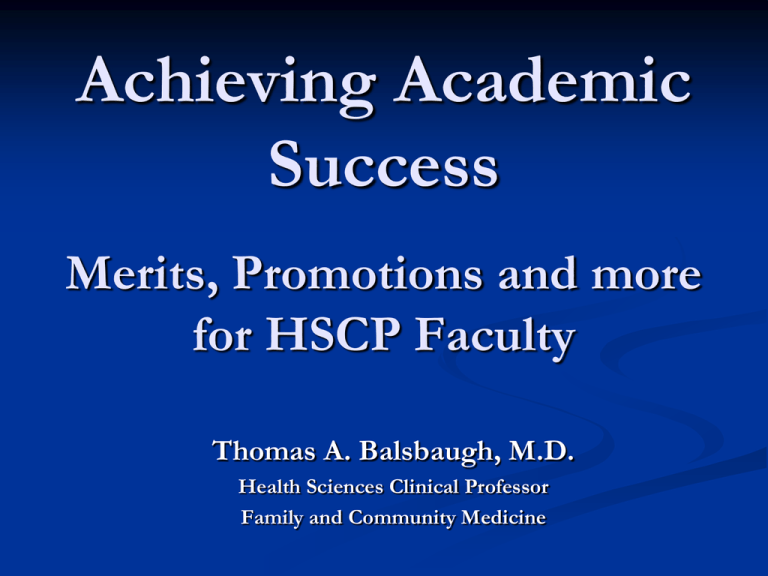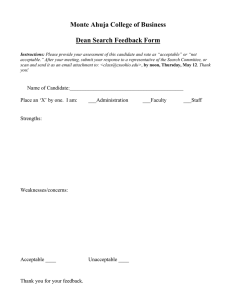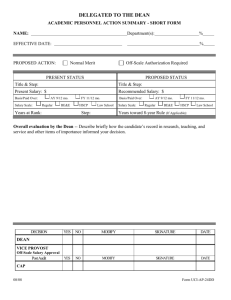Achieving Academic Success Merits, Promotions and more
advertisement

Achieving Academic Success Merits, Promotions and more for HSCP Faculty Thomas A. Balsbaugh, M.D. Health Sciences Clinical Professor Family and Community Medicine Objectives Learn the Essentials for Successful Advancement Understand the missions of the school Understand your academic series: Know how merit and promotions works What are the criteria for advancement in your series? How does it contribute to the school’s missions? Are you in the right series? If not, talk to your Chair about this early What it means How you’ll be evaluated Basic process Know where to go for advice, help, training Missions Our Mission: Improving lives and transforming health care. Our Vision: A healthier world through bold innovation. The Missions of the UCD School of Medicine Education Clinical Service Preventing & treating disease Service Training physicians to serve the people of California Contributing to department, School, University, profession and community Research New knowledge to improve health Issues for Schools of Medicine: Different culture than their parent university Different definitions of “faculty” Different focus Different teaching roles Different perspective on scholarship Importance of the Missions Merit advancements and promotions are based on your performance in each mission as required and expected for your particular series. Ensure your series expectations and requirements align with your interests and career goals. Research Focused Regular (ladder rank) In-Residence Adjunct Clinically Focused Clinical X Health Sciences Clinical Professor Understanding the Academic Series What series are you in? Health Sciences Clinical Professor (HSCP) series. Keys to Success in the HSCP Series: Excellence in Clinical Work Excellence in Teaching Excellence in Service University, Professional and Community Service What are the differences between the 5 academic series? Regular Series (FTE holders) In-Residence Series http://www.ucop.edu/acadpersonnel/apm/apm-280.pdf Clinical X Series http://www.ucop.edu/acadpersonnel/apm/apm-270.pdf Adjunct Series http://www.ucop.edu/acadpersonnel/apm/apm-220.pdf http://www.ucop.edu/acadpersonnel/apm/apm-275.pdf Health Sciences Clinical Professor Series http://www.ucop.edu/acadpersonnel/apm/apm-278.pdf 10 year trend of faculty in each series What is a Merit or Promotion? Essentially, it’s the process by which you climb the career ladder to higher titles and salary increases. Each step is associated with higher base for retirement. Here at the University of California, we evaluate each other more than any other education system in the world Pros: Your strengths are recognized and rewarded more frequently You can self-assess your progress towards your various career goals Cons: It takes time to prepare packets every 2-3 years You sometimes have to hear things you do not want to hear Merits Merit advancement includes an increase in the base salary, and is associated with a change in Step but not Rank. (Increase in base is important for retirement purposes) Includes a review of materials since your last successful action only (regardless if it was merit or promotion) “Normal” Timeline for Merit reviews: Every 2 years for Asst and Assoc Professors Every 3 years for Full Professors Every 4 years for Full Professors, Step 9+ Barrier Steps Promotions and Merits to “Barrier” Steps, are more in depth reviews. Must provide external reference letters, and covers larger review period. Barrier Step Actions: Promotion from Assistant to Associate Professor Promotion from Associate to Full Professor Merit Professor Step V to Step VI Merit to Full Professor, Above Scale (essentially, Step 10) Promotions Promotion includes increase in base salary, and is associated with a change in rank. Includes a review of all materials since you: • Received M.D. or Ph.D. for promo to Associate rank • Became Associate for promo to Full rank “Normal” timeline for Promotion Reviews Promo to Assoc Prof must occur within 8 yrs at Asst rank (per policy), usually occurs after two years at Asst, Step IV Promo to Full Professor usually occurs after two years at Assoc Prof, Step III Accelerated or Decelerated Advancement Accelerations or Deferrals (decelerations) are possible Accelerations extremely rare in HSCP Deferrals are allowed if you see your packet as not yet strong enough Plan for progress should be done at this time, to ensure you will be ready for review next year Criteria for acceleration: double the expectations for review cycle Usually must prove with quantity as well as with quality Advancement Diagram Professor Above Scale Above Scale Steps 4 years Full (Professor) Rank Step 6-8 3 years Full (Professor) Rank Associate (Professor) Rank Step 1 2 years Step 2 Step 3 2 years 2 years Assistant (Professor) Rank Step 1 Step 2 Step 3 Step 4 Step 5 . Step 6 . 2 years 2 years 2 years 2 years Yr 1 Yr 2 Yr 1 Yr 2 Step 1 Step 2 Step 3 Step 4 Step 5 3 years 3 years 3 years 3 years 3 years Step 4 . Step 5 . Yr Yr 1& 2 3 Yr Yr 1& 2 3 Step 9 4 years Step # Legend: Normal years at step before next advancement Each level represents Normal crossing a “barrier” Advancement advancement Other routes to advancement How will you be evaluated? Evaluation Criteria for all levels Teaching– Excellence expected Dedication, effectiveness, high evaluations, awards Clinical Service– Excellence expected Professional Competence: Licensure and Board Certification Recognition among peers, Leadership in discipline; Regional recognition (National recognition for Professor, Steps 6+) University/Professional/Community Service Outcomes, Role, Influence, Visibility Should increase with time Research and Creative Work Support only is expected for HSCP (patient data collection, clinical trials, etc) Your series should not discourage you from publishing (good way to get national recognition) Case Reports; Presentation of research/studies to peers or the public The following materials are reviewed in MyInfoVault (MIV) Personal Candidate Statement (optional & strongly recommended) Teaching Evaluations Teaching Activity List (lectures, advising, log of hours, etc) Service Activity List Publication list with URLs if available Reprints go with printed packet if URLs not available (not expected for HSCP) Grant List (not expected for HSCP) Department Letters with department vote. explains significance of materials above, plus info on clinical service and productivity Extramural Reference Letters (Appts, Promos, & Barrier Steps) Should You Write Candidate Statement? Writing the statement prompts self-reflection Keep it brief and concise May need to help reviewers understand how your efforts help achieve missions and improve the school Propose your plan for improvement if needed Tells Chair about your work & goals Tell the back story, don’t just restate the MIV packet lists Keep it positive Provide context/fit into long term goals so you know where you excelled and where you need improvement Chairs do not know your work as well as you do! It allows FPC to hear your voice- humanizes record What is in the Department Letter? Reflects department view based on the vote outcome (not Chair’s view) Chair can write separate letter, if s/he desires (almost never done) Evaluative, not just enumerative Discusses and summarizes the impact of candidate’s teaching, service, clinical acumen, and scholarly activities if applicable. It also can explain any extenuating circumstances Candidate must review the letter! What is the FPC? Faculty Personnel Committee Membership changes slightly every year (staggered three year terms for members) Charged with maintaining equity of expectations across school Makes recommendations to the Associate Dean based solely on academic criteria and on the materials presented Pay Attention to Feedback from FPC and Associate Dean Each merit action and promotion brings written feedback (positive or negative) Make sure you get a copy of these letters from your Chair or the admin office in department There is critical information for career guidance The letters give useful guidance about what to do for future actions Processes for Advancement Actions Basic Steps You create a packet in MIV (with staff member’s assistance) in your account https://Myinfovault.ucdavis.edu Your department reviews the materials, then votes and comments Action is submitted for review process Initially reviewed for accuracy and errors by an Academic Personnel Analyst Reviewed by Faculty Personnel Committee (FPC) HSCP actions are only reviewed by FPC at SOM, they do not go to CAP on campus Reviewed by Associate Dean of Academic Personnel Approved or Denied More detailed Policy on Reviews http://manuals.ucdavis.edu/apm/220afProc1.pdf Candidate is responsible for developing packet Department chair Consults with candidate regarding preparation of review file; if applicable, solicits letters of evaluation. Provides copy of redacted extramural letters to candidate and informs candidate that he/she has the option to submit a rebuttal letter within 10 calendar days from date of receiving copies of redacted extramural letters. Submits candidate's dossier to approved peer group(s) for comment. Makes dossier and peer-group comments available to approved voting group who subsequently vote. Prepares departmental evaluation/recommendation letter; obtains review of letter by voting faculty; provides candidate with copies of all nonconfidential documents. Informs candidate of right to submit a rejoinder to the departmental recommendation within 10 calendar days from date of receipt of department letter. Obtains Candidate's Disclosure Certificate from candidate that verifies that he/she has reviewed the file. Forwards complete review file to dean. Dean's Office/Dean Dean Evaluates review file and makes recommendation to dean. Dean Submits the proposed action directly to appropriate personnel committee. Faculty Personnel committee Assures that review file is in compliance with established policies and procedures and assembled in established format for evaluation. Makes final decision; at dates specified by the Vice Provost, sends announcement to department chair, with comments. Department chair Transmits final decision and copy of reviewers' comments. This should be done in writing to document date of notification. If the action is denied, has candidate sign Candidate's Certification indicating he/she has received reviewers' comments; sends form to dean. http://academicpersonnel.ucdavis.edu/delegations.cfm Helpful Tips Keep track of your activities on a monthly basis Clinical: Teaching: clinic teaching hours, didactic lectures, conferences, mentoring, etc. Always keep a record of your evaluations; and request copies if they are not automatically sent to you! Service: Track your own clinical productivity outcomes through Departmental reports (CQI, RVU, patient satisfaction, etc) Committees, taskforces, society/org. work, editorial/reviewer duties, volunteer work, etc. Research and Creative Work: Any help you’ve provided to colleagues, clinical studies, abstracts, presentations (to peers or public)? When preparing for advancement Show evidence of having met the criteria for advancement in each mission Quantity, quality, significance and impact. Highlight accomplishments rather than promise. Describe your leadership role if it is not obvious, and address how it translates into supporting missions (example: leading curriculum development team; primary trainer for new clinical procedure in clinic; EMR expert) Learn to Use MIV! http://myinfovault.ucdavis.edu You each have an account in MyInfoVault (Kerberos ID and passphrase) Faculty Personnel Committee and Associate Dean will use your packet in MIV to evaluate your work You can learn to input all the data yourself, or at least to manage aspects of the program (but always let your assistant or the Acad. Personnel Coordinator know of any changes you make besides just adding new information) Attend the Introduction to MIV workshop MIV (continued) MyInfoVault is the ideal repository: All education and teaching efforts Be sure your staff is entering all evaluation scores All clinical service commitments All service activities Any research- whether helping or more Keeps a history of past actions You can use to easily create CV or NIH Biosketch Learn how to work with those around you Administrative Staff You my have an assistant assigned to you or your division. Get to know them and discuss the expectations you have, and what their understanding of their job is. Clinical Staff Clinic Manager The future of healthcare depends on teamwork. Successful clinical faculty need to demonstrate that they are both good team members and leaders. Your clinical achievements and reputation increasingly rely on your teamwork skills. Ask for your patient satisfaction scores, get feedback to ensure you are doing the best job possible; get regular reports on your clinical productivity and quality measures. Colleagues Seek opportunities to collaborate with other faculty: CQI projects, new curriculum, committee, multidisciplinary teams. It can create new opportunities, salary support, and a network for your success. Caution! Don’t rely on a “special deal” with the Dean or Chair to advance Dean/Chair frequently has no knowledge of such a deal Reviewers (FPC, Dean) do not recognize deals that foster inequitable treatment of faculty Where to go for help and information HSCP Mentoring Needs A Mentor is a key source of guidance for junior faculty or new faculty What areas of your career would benefit from working with a mentor? Learning how UCDHS works: different software programs, knowing which offices handle what, finding resources, etc. How many of you receive feedback on your teaching style from your peers? How many receive feedback on clinical or service delivery? Expectations For Your Chair To be proactive in career advancement of faculty On-going mentoring Annual career planning meeting Meet with candidate at merit/promo time Review criteria for advancement Discuss content of dossier and deadlines Request list of potential extramural references – external references for promotion to Assoc and barrier step merits Liaison between faculty & Administration/Dean Faculty Development (916) 703-9230 Look for info on programs: http://www.ucdmc.ucdavis.edu/facultydev/ Faculty Development Newsletter (quarterly) E- mail announcements Examples: Teaching Scholars Program Mentoring Academy Leadership Workshops Other Resources FAQs, policies, resources: http://www.ucdmc.ucdavis.edu/academicpersonnel http://academicpersonnel.ucdavis.edu Or call: Office of Academic Personnel Associate Dean of Academic Personnel Main line: 916-734-4610

